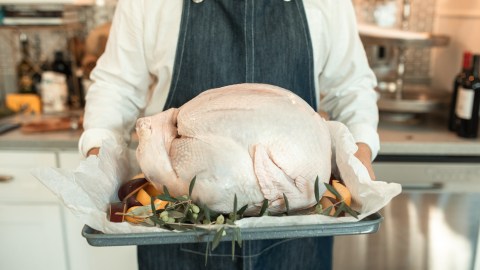How long does turkey take to thaw? There’s a calculator for that

Credit: RODNAE Productions from Pexels
- This year, many people will be making a Thanksgiving dinner for the first time. It's often harder than it looks.
- Luckily, an online calculator website has one just for thawing turkey, and can explain why you need to wait so long.
- The website has other calculators as well, for needs you didn't know you had.
This year, with the Center for Disease Control advising Americans to stay home for Thanksgiving, many people will be faced with the prospect of preparing dinner for a smaller table or cooking a traditional Thanksgiving meal by themselves for the first time. The latter of these two issues can seem particularly daunting.
The art of preparing a turkey can seem incredibly arcane to those who haven’t done it before—foul it up enough and you’ll give yourself salmonella.
Luckily, science is here to help. A quick review of thermodynamics provided by the Turkey Thawing Calculator at Omni Calculator will show you not only how to thaw your turkey correctly but how math and science are all around us.
The Omni Calculator website is home to calculators that can determine many things, including how long you can be in the sun safely, to the odds of your town having a white Christmas. It now has a dedicated tool for finding how long it will take you to prep your turkey in time for a socially distanced holiday. The Turkey Thawing Calculator was created by Jagiellonian University cognitive science graduate Maria Kluziak with the help of Wojciech Sas, a Ph.D. candidate in molecular magnetism and nanostructures at the Institute of Nuclear Physics in Poland.
The fundamental problem is that you need to add heat to the frozen bird to unfreeze it without also encouraging the growth of bacteria. To do this, you have to put the turkey somewhere where it will heat up slowly and evenly. There is a trick, though; this can take a long time because of the amount of energy involved. Exactly how long you need to spend on it can be hard to determine if you’ve never done it before.
This is where practical, day-to-day science comes in. The processes of heating something are well-studied areas of thermodynamics which we use every day.
As Kluziak tells Big Think:
“If you look closely, you’ll notice how we’re all surrounded by numbers. Yet most of the time people choose to go with their intuition while making day-to-day decisions. We, as scientists and experts in our own fields, are trying to build a world where people make better, more informed decisions backed by concrete science – Using physics to chill drinks, math to find out how much pizza to get, and even calculating how much groceries are enough to survive a quarantine. It works.”

Credit: Omni Calculator
By slowly exposing the turkey to cool air or water, it heats up to a point where the bird is above freezing but not so warm that bacteria will start multiplying. Two of the safe ways to do this stand above all others; you can thaw it in the refrigerator or the sink.
Using a refrigerator can take days; the calculator creators suggest a day for every four pounds of bird. Doing it with cold water in the sink is faster, needing only two hours per pound, but requires that you drain and refill the sink with new, cold water every thirty minutes. The ideal temperature during thawing shouldn’t exceed 39°F/4°C.
“In our thawing model, we use a scientific approach, which is based on the use of heat transfer equations,” the scientists write. “Since these types of problems are, in general, very complicated, we use some approximations, which allow us to estimate the thawing time with reasonable accuracy. As a result, you can see how the average temperature of the turkey changes in time.”
You can learn more about the equations and get tips on using the calculator here. You can also learn why you shouldn’t use a hairdryer or a tub full of hot water to do the job.
One of the best parts of science is that its findings are often universally applicable. If you understand why something works in one case, you can use it everywhere else. Kluziak reminds us why this might be great for cooking:
“The rules that govern the process of thawing are roughly the same for every kind of food, what’s different are the numbers that determine the more specific things like thawing time. The general ideas remain the same regardless of the food, and I would say they are pure common sense. For example, if you’re defrosting food, don’t do it at room temperature to avoid bacteria – this is true every time!”
Whoever said you’d never use the science you learned in high school at home didn’t understand how often we use physics—this calculator remind us that it is everywhere. So fear not, ye first-time turkey chefs! Science can help you have your main course and eat it too.





